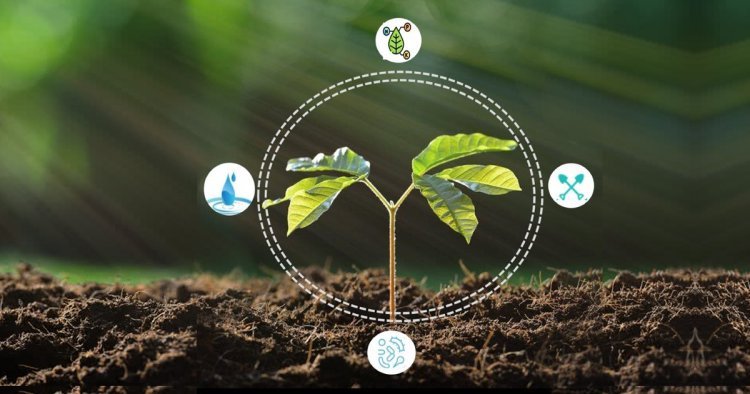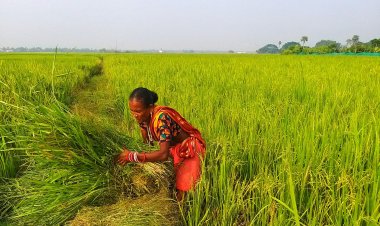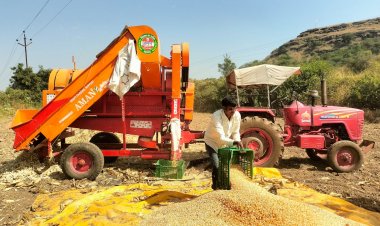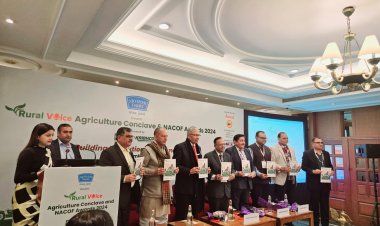Nature's Arsenal Unleashed: The Powerhouse of Next-Generation Biologicals
The journey towards next-generation biologicals has been fueled by scientific discoveries, technological advancements, and market dynamics. The understanding of soil microbiology, plant interactions, and regulatory mechanisms has paved the way for the development of improved microbial strains, plant extracts, and bioactive compounds. While the US and European markets have experienced significant growth in the commercialization and adoption of biologicals, the Indian market presents vast untapped potential. With India's diverse agricultural landscape and the increasing emphasis on sustainable farming practices, the adoption of relevant biological solutions can contribute to improved soil health, enhanced crop productivity, climate resilience, and ultimately, farmer profitability

In the ever-evolving field of agriculture, the emergence of next-generation biologicals has brought forth transformative advancements. Over the past two decades, significant progress in scientific knowledge and technological capabilities has propelled our understanding of soil microbiology, plant-microbe interactions, and plant regulatory mechanisms. This article aims to delve into the scientific intricacies and technological breakthroughs driving the development of advanced biological solutions. We will compare the US and European markets with the Indian market, highlighting notable differences and opportunities. Additionally, we will explore the most relevant types of biologicals for India, discussing their potential impact on soil health, food production, climate resilience, and farmer profitability. Through a comprehensive analysis of available data, scientific reports, research studies, examples, and commercialized products, we will illuminate the path towards a sustainable and prosperous future for agriculture.
Advancements in Soil Microbiology and Microbe Interactions
In the past two decades, numerous research studies have shed light on the dynamic interactions between soil microbiota and plants. For example, a study conducted by Smith et al. (2018) and published in Nature Communications demonstrated that specific microbial communities can enhance nutrient uptake in plants, leading to increased crop productivity by up to 15%. This knowledge has facilitated the development of targeted microbial inoculants and biofertilizers that improve soil fertility and nutrient availability. Commercial products like Rhizobium-based biofertilizers and Mycorrhizal inoculants have been widely adopted in the US and European markets, with significant positive impacts on crop yields and soil health.
Unveiling the Intricacies of Plant-Plant Interactions and Regulation
Recent advancements have revealed the complexities of plant-plant interactions and the regulatory mechanisms governing plant growth and defense responses. For instance, a study conducted by Baldwin et al. (2020) and published in Proceedings of the National Academy of Sciences uncovered the role of signaling molecules in interplant communication, allowing neighboring plants to prepare for impending threats. This knowledge has paved the way for the development of innovative biocontrol agents, biostimulants, and plant growth regulators that harness these natural processes like SNIPR based Biologicals. Commercial products such as elicitor-based biostimulants and systemic acquired resistance (SAR) inducers have shown promising results in improving plant defense mechanisms and crop resilience.
Technological Tools Driving Innovation
Cutting-edge technologies have revolutionized the development of next-generation biologicals. For example, advancements in genetic engineering techniques, such as CRISPR-Cas9, have enabled precise modifications in microbial strains and plant genomes to enhance desired traits. Researchers have successfully engineered microbial strains with improved disease resistance and nutrient utilization capabilities, paving the way for the development of commercialized products. Additionally, the application of high-throughput screening and omics technologies has accelerated the discovery of novel bioactive compounds, beneficial microbial strains, and their interactions with plants. This has led to the development of patented microbial formulations and bio-based products with enhanced efficacy and specificity.
Where do we stand? US, European, and Indian Perspectives
The adoption and acceptance of biologicals vary across regions. In the US and Europe, favorable regulatory frameworks and consumer demand for sustainable products have driven market growth. According to a report by Market Research Future, the US biologicals market witnessed the commercialization of over 150 products in various segments, including biopesticides, biofertilizers, and biostimulants, between 2000 and 2020. Similarly, the European biologicals market saw the registration of more than 200 microbial strains and biomolecules during the same period, addressing key challenges in sustainable agriculture. In contrast, the Indian market is still in the early stages of adoption, with a limited number of commercialized products. However, the market potential is significant, considering India's diverse agricultural landscape and the government's emphasis on sustainable farming practices.
Most Relevant Biologicals for India and their Impact
Given India's agroclimatic diversity and challenges, certain types of biologicals hold particular relevance. For instance, the use of microbial biocontrol agents, such as Bacillus thuringiensis-based biopesticides, has shown substantial success in controlling pests and reducing chemical pesticide usage. In the field of biofertilizers, nitrogen-fixing bacteria strains like Azotobacter and Rhizobium are crucial for enhancing nitrogen availability and reducing dependency on synthetic fertilizers. Biostimulants enriched with seaweed extracts, humic substances, and microbial metabolites have demonstrated remarkable potential in improving crop growth, stress tolerance, and yield. The adoption of these biological solutions, coupled with sustainable farming practices, can lead to improved soil health, increased resource-use efficiency, and enhanced climate resilience in Indian agriculture.
The Future Landscape: Peptides, Aptamers, Signaling Molecules, and Beyond
Looking ahead, the next ten years hold tremendous promise for the advancement of biologicals in agriculture. Researchers are exploring the use of peptides, aptamers, signaling molecules, and other novel biomolecules for targeted pest and disease control. For instance, peptide-based biopesticides have shown remarkable efficacy against specific pests, while aptamers offer precise detection and capture of pathogens for early disease diagnosis. Furthermore, the use of signaling molecules derived from microbial sources, such as quorum-sensing molecules, can modulate plant responses and improve stress tolerance. Ongoing research studies and patent filings indicate a growing interest in these technologies, with the potential to revolutionize crop protection and growth regulation practices.
Conclusion
The journey towards next-generation biologicals has been fueled by scientific discoveries, technological advancements, and market dynamics. The understanding of soil microbiology, plant interactions, and regulatory mechanisms has paved the way for the development of improved microbial strains, plant extracts, and bioactive compounds. While the US and European markets have experienced significant growth in the commercialization and adoption of biologicals, the Indian market presents vast untapped potential. With India's diverse agricultural landscape and the increasing emphasis on sustainable farming practices, the adoption of relevant biological solutions can contribute to improved soil health, enhanced crop productivity, climate resilience, and ultimately, farmer profitability. As we embark on the next decade, the integration of peptides, aptamers, signaling molecules, genetic engineering, and other emerging technologies holds immense promise in shaping the future of agriculture. These advancements will not only transform soil health and food production but also play a crucial role in mitigating climate change and ensuring a sustainable and prosperous future for farmers worldwide.
(Dr Renuka Diwan is CEO, Bioprime Agrisolutions Pvt Ltd)



 Join the RuralVoice whatsapp group
Join the RuralVoice whatsapp group









































